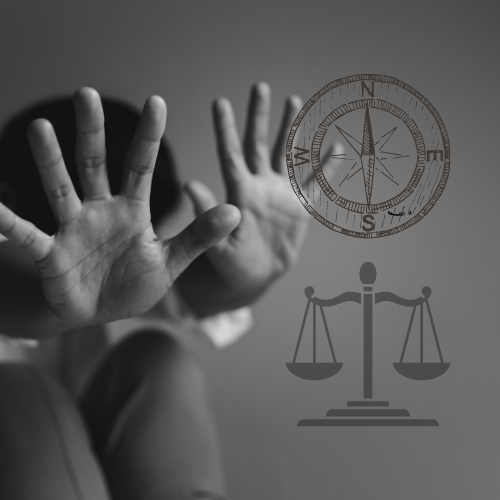Surviving domestic violence is a courageous act, and navigating the legal system can be a daunting part of the journey towards safety and justice. Understanding your legal rights and the resources available in Australia is crucial for protecting yourself and seeking accountability for the abuser. This comprehensive guide will provide you with practical advice and insights into the Australian legal system to help you navigate this challenging process.
Disclaimer:
The information provided in this article, “Navigating Australia’s Legal System: A Guide for Abuse Survivors,” is intended for general informational purposes only and should not be considered legal advice. While every effort has been made to ensure the accuracy of the information, laws and legal procedures can change, and individual circumstances vary. It is strongly recommended that survivors seek professional legal counsel and support tailored to their specific situation. Healing Through Love and the author do not assume any responsibility for actions taken based on the information provided in this article. For personalized legal advice, please consult a qualified legal professional.
Understanding Domestic Violence Legislation in Australia

Australia has specific laws designed to protect victims of domestic violence and hold perpetrators accountable. These laws vary by state and territory, but they share common objectives: ensuring the safety of victims, providing legal recourse, and preventing further abuse.
Key Legislation
Family Law Act 1975
Provides protection for children and family members from domestic violence, allowing the court to issue orders to protect victims.
Crimes (Domestic and Personal Violence) Act 2007
Governs the issuance of Apprehended Domestic Violence Orders (ADVOs) in New South Wales.
Domestic and Family Violence Protection Act 2012
Applies in Queensland, providing for the issuance of Domestic Violence Orders (DVOs).
Types of Orders
Protection Orders: These orders can include Domestic Violence Orders (DVOs), Apprehended Domestic Violence Orders (ADVOs), and Family Violence Intervention Orders (FVIOs), depending on the state or territory.
Interim Orders: Temporary orders issued to provide immediate protection until a final order can be made.
Steps to Navigate the Legal System
Navigating the legal system involves several critical steps. Each step is designed to ensure your safety, provide legal protection, and seek justice against the abuser.
1. Reporting Domestic Violence
The first step in seeking legal protection is to report the abuse to the police.
Contacting the Police
– Emergency Situations: Call 000 if you are in immediate danger.
– Non-Emergency Situations: Contact your local police station to report the abuse and provide detailed information about the incidents.
Making a Statement
– Provide a clear and detailed statement to the police, including dates, times, and descriptions of the abuse.
– Include any evidence you have, such as photographs, medical reports, or witness statements.
2. Applying for a Protection Order
A protection order is a legal document issued by the court to protect you from further abuse.
Types of Protection Orders
– Domestic Violence Order (DVO): In Queensland and other states.
– Apprehended Domestic Violence Order (ADVO): In New South Wales.
– Family Violence Intervention Order (FVIO): In Victoria.
Applying for an Order
– Visit your local courthouse or contact a legal service provider to apply for a protection order.
– Complete the necessary forms and provide detailed information about the abuse.
– Attend the court hearing where a magistrate will review your application and decide whether to issue the order.
3. Legal Representation and Support
Having legal representation can significantly impact the outcome of your case and ensure your rights are protected.
Finding Legal Assistance
– Legal Aid: Legal Aid offices in each state and territory provide free or low-cost legal assistance to eligible individuals.
– Community Legal Centres: Offer free legal advice and representation to victims of domestic violence.
– Private Lawyers: If you can afford it, hiring a private lawyer with experience in domestic violence cases can provide dedicated support.
Working with Your Lawyer
– Provide your lawyer with all relevant information and evidence.
– Discuss your goals and desired outcomes.
– Follow your lawyer’s advice and attend all scheduled meetings and court hearings.
4. Attending Court Hearings
Court hearings are a crucial part of the legal process, and it’s essential to be prepared.
Preparing for Court
– Documentation: Bring all relevant documents, including your application, evidence, and any previous orders.
– Witnesses: If you have witnesses who can support your case, ensure they are prepared to testify.
Court Procedures
– Initial Hearing: A preliminary hearing where the magistrate reviews your application and may issue an interim order.
– Final Hearing: A detailed hearing where both parties present their evidence, and the magistrate makes a final decision.
5. Enforcement of Protection Orders
Once a protection order is issued, it must be enforced to ensure your safety.
Compliance and Enforcement
– Abuser Compliance: The abuser must comply with the terms of the protection order. Violating the order is a criminal offense.
– Reporting Violations: Immediately report any violations of the order to the police.
Support Services
– Police Support: The police can provide assistance and ensure the protection order is enforced.
– Domestic Violence Services: Contact local domestic violence services for ongoing support and assistance.
Support Resources for Domestic Violence Survivors

Numerous resources are available in Australia to support domestic violence survivors. These resources offer legal assistance, emotional support, and practical help.
Legal Assistance
Legal Aid
Provides free or low-cost legal services to eligible individuals.
– Contact: Visit the Legal Aid website for your state or territory.
Community Legal Centres
Offer free legal advice and representation.
– Contact: Find your local Community Legal Centre through the National Association of Community Legal Centres.
Domestic Violence Services
1800RESPECT
A national sexual assault, domestic and family violence counselling service.
– Contact: 1800 737 732
Domestic Violence Crisis Service
Provides crisis intervention, support, and advocacy.
– Contact: 1300 782 200
Counselling and Emotional Support
MensLine Australia
Offers support for men experiencing domestic violence.
– Contact: 1300 78 99 78
Lifeline Australia
Provides 24/7 crisis support and suicide prevention services.
– Contact: 13 11 14
Housing and Financial Assistance
Department of Housing
Provides emergency housing and support services.
– Contact: Visit the Department of Housing website for your state or territory.
Centrelink
Offers financial assistance and support services.
– Contact: 13 24 68
Empowering Yourself Through Knowledge and Support

Navigating the legal system as a domestic violence survivor can be overwhelming, but knowledge and support can empower you to take control of your situation.
Educate Yourself
– Legal Rights: Understand your legal rights and the protections available to you.
– Court Procedures: Familiarize yourself with court procedures and what to expect during hearings.
Seek Support
– Emotional Support: Reach out to friends, family, and support groups for emotional support.
– Professional Help: Engage with counsellors and therapists specializing in trauma and domestic violence.
Self-Care and Well-Being
– Physical Health: Prioritize your physical health by seeking medical care and maintaining a healthy lifestyle.
– Mental Health: Practice mindfulness, meditation, and relaxation techniques to manage stress and anxiety.
Navigating the legal system in Australia as a domestic violence survivor requires courage, determination, and the right support. By understanding your legal rights, seeking assistance, and utilizing available resources, you can protect yourself and seek justice against your abuser. Remember, you are not alone, and support is available to help you through this challenging journey. Empower yourself with knowledge and take the steps necessary to ensure your safety and well-being.
At Healing Through Love, we are committed to providing resources, support, and education to help survivors of domestic violence navigate the legal system and rebuild their lives. Your strength and resilience are the foundation for a new beginning. Reach out, seek support, and take the steps towards a future filled with hope and empowerment.


